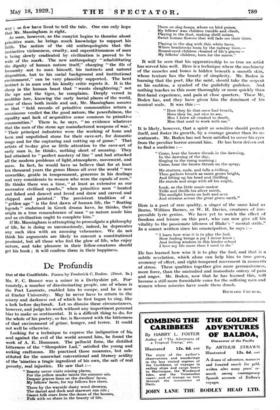De Profundis Out of the Coalfields. Poems by Frederick C.
Boden. (Dent. 30.) Ma. F. C. RODEN was a miner in a Derbyshire pit. For tunately, a number of discriminating people, one of whom is the Poet Laureate, enabled him to escape, and he is now at Exeter University. May he never have to return to the misery and darkness out of which he first began to sing, like a lark before daybreak. Let us dismiss these circumstances, however, and judge his work without any impertinent personal bias to make us sentimental. It is a difficult thing to do, for the whole of his poetry, so far, is flavoured with the bitterness of that environment of grime, hunger, and terror. It could
not well be 'otherwise.
Looking for a technique to express the indignation of his soul against the evil of the world around him, he found the work of A. E. Housman. The pellucid form, the distilled bitterness of the "Shropshire Lad," satisfied the young and seeking craftsman. He practised those measures, but sub- stituted for the somewhat conventional and literary acidity of the 'nineties a tragic ingredient of his own, the salt of real poverty, real injustice. He saw that :—
"Beauty never visits mining places.
For the yellow smoke taints the summer air. Despair graves lines on the dwellers' faces, My fellows' faces, for my fellows live there.
There by the wayside dusty weed drowses, The darnel and dock and starwort run rife ; Gaunt folk stare from the doors of the houses, Folk with no share in the beauty of life.
There on slag-heaps, where no bird poises, My fellows' wan children tumble and climb, Playing in the dust, making shrill noises, Sweet human flowers that will fade ere their time.
Playing in the slag with thin white faces, Where headstocks loom by the railway lines,— Round-eyed children cheated of life's graces— My fellows' children, born for the mines.
It will be seen that his apprenticeship to so true an artist has served him well. Here is a technique where the machinery
• of the muscles and bones is hidden beneath a smooth skin, whose texture has the beauty of simplicity. Mr. Boden is learning that the poet, like the saint, should take the serpent as his emblem, a symbol of the guilefully guileless. And nothing teaches us this more thoroughly or more quickly than first-hand experience, and pain at close quarters. These Mr. Roden has, and they have given him the dominant of his musical scale. It was this :—
" Here they lie that once had breath, Here they lie, not nice to see, Men I knew all crushed to death, Men that used to work with me."
It is likely, however, that a spirit so sensitive should proteet itself, and foster its growth, by a courage greater than its re- sentments. Mr. Boden has not been satisfied to cover his eyes from the peculiar horror around him. He has been driven out to find a medicine :—
"Come, hear the brown thrush in the dawning, In the dawning of the day,
Singing to the rising morning ; Come, hear the brown thrush on the spray.
He stutters, nods, and falls a-trilling, Then gathers breath as morn grows bright, And lifting up his head and thrilling He stands and sings with all his might.
Look, as the little music-maker Trills and thrills his silver mirth, The sunlight bursts on holt and acre And streams across the great green earth."
Here is a poet of rare quality, a singer of the same kind as Bums, William Barnes, or W. H. Davies, creatures of irre- pressible lyric genius. We have yet to watch the effect of freedom and leisure on this poet, who can now give all his vitality to the passionate idleness of Blake's "mental strife.". In a sonnet written since his emancipation, he says :—
"I learn how wise it is to play the fool, How fooling brings a joy I never knew; And feeling wisdom in this kinder school I love my life more than I used to do."
He has learned how wise it is to play the fool, and that is a subtle revelation, which alone can help him to true grace, economy of effort, and right-tempered movement in moments of stress. These qualities together give more persuasiveness, more force, than the unstudied and immediate outcry of pain and anger. Mr. Boden, now that he has learned this, will become a still more formidable voice for the suffering men and women whose miseries have made them dumb.
RICHARD Cnuncit.












































 Previous page
Previous page